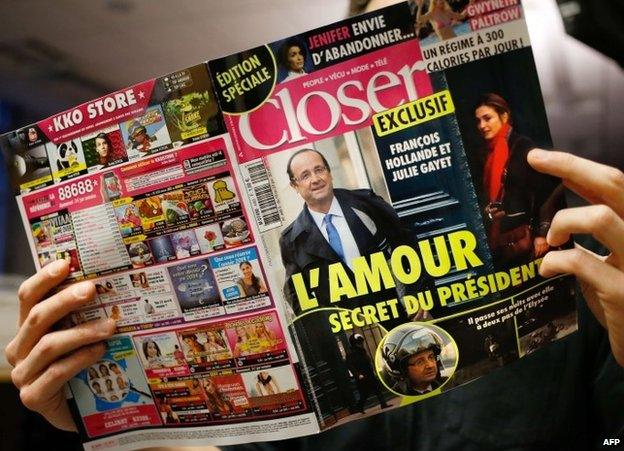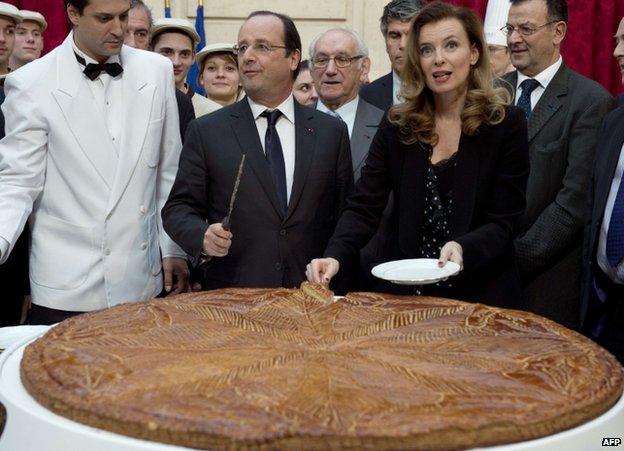France reacts to row over Hollande affair allegations
- Published

"The president's secret love" - headline in Closer magazine
Political friends and foes alike have rallied around French President Francois Hollande, who is considering legal action against a magazine for delving into his private life.
The French public are more ambivalent about the right to privacy of their head of state, the most unpopular president of France in a generation.
With Closer magazine alleging an affair between Mr Hollande and actress Julie Gayet, questions are also being asked about the status of the president's official albeit unmarried partner, Valerie Trierweiler.
When contacted by French media, leading members of the Socialist Party followed the line set by Mr Hollande himself.
Prime Minister Jean-Marc Ayrault said the president was "perfectly right" to demand privacy while Interior Minister Manuel Valls simply pointed out that the president was considering legal action.
Harlem Desir, the party's chairman, said: "I regret and deplore [the article in Closer] but, once again, this has no place in the realm of public debate."
One of the more surprising statements of support for Mr Hollande came from Marine Le Pen, leader of the far-right National Front, though her solidarity was qualified.
"As long as it doesn't cost the taxpayer a penny... I believe everyone has the right to have their private life respected..." she said.
"There is no reason why the media should take it upon themselves to reveal a person's private life, provided their political activity is not affected."
'Invited in'
Asked about the allegation that Mr Hollande regularly spends the night with Ms Gayet in a flat near the Elysee Palace, one Parisian said: "I think Closer magazine is a disgusting publication. It's Francois Hollande's private life. Life is life. I think it's not an interesting issue and there are many other things more important than this one."
"I find it low," said another. "Frankly it's not interesting. He [the president] can react the way he wants. It's his private life no matter what."
But one tweeter in Paris said Mr Hollande should thank Closer for creating a "diversion". "As long as we talk about his mistress, we don't talk about unemployment or the crisis which drags on," she said.
Leading newspapers on the left and right ran more or less straight accounts of the story on their websites. In the absence of editorials, readers had their own say and appeared low on sympathy for Mr Hollande, at least initially.
"The president is a public figure and the notion of private life [for him] should be slightly different from that of mere mortals," wrote one reader of centre-right daily Le Figaro.
A reader of Le Monde, a daily traditionally regarded as pro-Socialist, said: "Every human has the right to respect for their private life provided they have not invited us in to see it in the past."
"Remember the declarations about 'the woman of his life'," the reader added, clearly referring to an interview Mr Hollande gave to Gala magazine in 2010.
In that interview, the Socialist politician had talked about his relationship with Ms Trierweiler, for whom he had left his previous partner and mother of his four children, Segolene Royal.

Mr Hollande and Ms Trierweiler appeared in public together on Monday
"I can understand the French wanting to know better the personality of those who represent them, without having to go into intimate details," he said in the interview. "As for me, everyone knows that I have been sharing my life with Valerie Trierweiler for several years now, to my great happiness."
The future of Ms Trierweiler became a hot topic on French social media on Friday, after the Closer article was published, with people asking why she should still be living in the Elysee Palace. Tweeters dubbed the "first lady of France" the "first cuckold of France".
Mr Hollande's partner became famous for her outbursts on Twitter early in his presidency, once famously undermining Ms Royal.
"I'm wondering at what point Val the volcano is going to erupt," wrote Matthew Campbell, Paris correspondent for The Sunday Times, in a tweet, external on Friday.